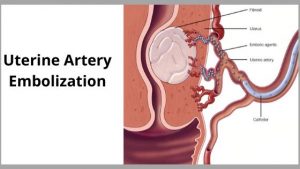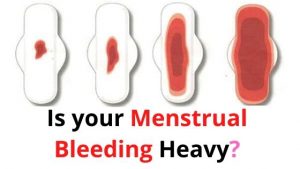
Table of Contents
How Heavy is too Heavy Period?
For every woman with a normal menstrual blood loss (MBL) it’s usually 30 mL to 40 mL per menstrual cycle, while for heavy menstrual bleeding it always more than 80 mL blood loss per cycle.
In the medical field, it can be defined as menstrual bleeding that is abnormal or heavier than the normal menstrual bleeding.
Heavy menstrual bleeding most time is usually caused by the following:
Hormone imbalance, Dysfunction of the ovaries, Uterine fibroids, Polyps, Adenomyosis, Intrauterine device (IUD), Pregnancy complications, Cancer, Inherited bleeding disorders, Medications, and Other medical conditions.
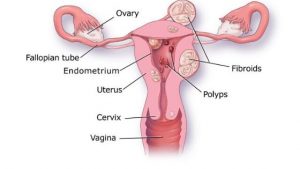
Heavy Flow of Periods
Most women with heavy menstrual bleeding are caused by either inherited or acquired bleeding disorders.
And the majority of these women are considerably younger than the women who suffer from this due to other reasons.
Heavy menstrual bleeding is a major problem, and very common enough to cause a lot of women of reproductive age to seek treatment.
It is a public health challenge and does leads to an iron deficiency called anemia and may affect a woman’s quality of life.
Anemia is a common blood problem that reduces the number of circulating red blood cell that makes you feel tired or weak.
Likewise, it does cause painful menstrual cramps (dysmenorrhea) which can sometimes be severe to require medical attention.
Making 20% of women with heavy menstrual bleeding to have a bleeding disorder. And that of course, is not good for any woman.
Other causes of heavy menstrual bleeding aremenorrhagia and hysterectomies.
A lot of women with menorrhagia are said to be caused by heavy or prolonged bleeding, likewise, the majority of those who undergo hysterectomies tend to have heavy menstrual bleeding as the main cause.
Though research on women with heavy and normal menstrual bleeding has always shown that increased local inflammation is linked with increased menstrual blood loss.
But they have the choice of a number of medical treatment options to reduce their blood loss and improve quality of life.
And for a thorough underline cause and treatment, medical history should be screened and if indicated, further hematologic testing is supposed to be carried out.
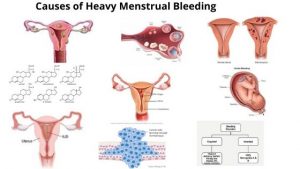
Blood Clots During Your Period
Menstrual clots can travel deep into the uterus or fallopian tubes and cause damage to the tissues or organs.
Because of this, it is important to figure out how to stop heavy menstrual bleeding with clots and treat them at the same time.
The problem with heavy menstrual clots is that they form when there is a reaction between the blood that flows through the blood vessels and the blood that is being pushed out by the walls of the blood vessels.
What this means is that blood that has already been shed through the walls of the blood vessels is turned into the blood that is traveling along the walls of the blood vessels to be cleaned or evacuated.
This causes the blood to slow down and create a clot.
Since the blood is already diluted by the blood that has already been shed from the walls of the blood vessels, it does not matter where the blood clot is initially formed.
The blood has to travel through the uterus and endometria’s linings to get to the point where it can clot.
This can cause the blood to clot in a variety of places and can create a major problem.
The blood that is traveling along the blood vessels can eventually settle in the vessels or the internal organs, but if the blood stays there long enough, it will damage or irritate the tissues and organs.
When it comes to how to prevent clots from forming, there are a number of things that you can do.
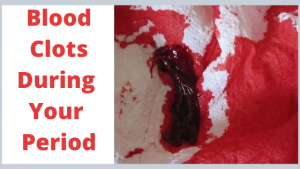
The first thing is to drink plenty of water.
When you exercise or when you are sick, you might not be able to drink enough water to replenish the fluids that are lost through the urine.
The second thing is to have a certain amount of salt in your body.
The cells need sodium in order to get rid of the waste material and to maintain the blood pressure.
This is something that will only get better as you age, and if you are over 40, you may be lacking in salt in your system.
There are some other things that you can do to prevent heavy menstrual bleeding with clots.
The first is to relax and to not be anxious.
Anxiety can cause stress and can cause a person to relax and be less active.
When people are not at their best, they have a harder time with things and can also cause some of the clots to form.
Cervical checks and screening are also a way to find out if there are any serious issues with the uterus or the blood vessels in the uterus.
This is something that you can do on your own. It is important to get regular checkups for any of these issues.
Chronic constipation is also a problem.
When a person cannot get a bowel movement, then they can easily pass a clot, which can cause significant damage to the organ.
In a lot of cases, the lumps and bumps that are in the rectum can be caused by chronic constipation.
Another issue that can cause clots is when a woman is having a deep period.
The tissue in the uterus is also thinner than normal and will cause the blood to thicken even more.
This can cause a situation where the blood in the vaginal area can be thinner than normal and a clump of blood can be formed.
Smoking is also a bad habit that can cause trouble.
When a person is smoking, they will eventually get irritable or even more irritable with their period.
The thing to remember is that the first thing to know is to start using a treatment that will allow you to get the proper amount of rest that you need.
When you go on a lot of heavy periods. To prevent bad things from happening. And to prevent your heavy menstrual bleeding with clots from getting worse.
How to Stop Heavy Menstrual Bleeding with Clots?
How to stop heavy menstrual blood with cramping and pain can be very simple.
All it takes is a course of action that will help the uterus to relax, and this will cause the bleeding to stop.
Usually, the symptoms are accompanied by severe pain in the abdominal area.
Some other things that can be expected during the condition are backache, pain in the lower back, neck, lower back, shoulder and arm, and pelvic pain.
One way to do this is to buy a special applicator that can be used to tamp on the top of the blood flow and prevent heavy bleeding.
This special applicator is Pads (or sanitary napkins), Tampons, Period underwear, and Menstrual cups.
A woman can wear this applicator for the entire duration of her menstruation cycle.
This can prevent cramping by the uterine muscles and can help to keep the uterus from contracting out of control.
When menstrual blood begins to run, the applicator can be removed and replaced with another.
Many women tend to be conscious of what they have to do because of the advantage that it can lead to the malfunctioning of the reproductive system.
Moreover, this is because they are unaware of what causes and what the treatment of heavy bleeding with clots and pain should be.
This article outlines the things that women should do when they have this condition.

Periods Heavy? Here are some precautionary measures to take.
- One thing that women should consider in this condition is that they should not touch anything with their bare hands because this can trigger and aggravate the pain of the situation.
- Instead, they should wear gloves and wash their hands thoroughly with warm water.
- It is also recommended that they should avoid eating any food that is not prepared and cooked properly.
- The great advantage that women should take into consideration in this condition is that there is no need to take any additional medication because they can use other natural remedies.
- They should make sure that they take Tylenol as prescribed by the doctor.
- It is also possible to use pills of Ephedra that are safe and reliable.
- The disadvantage that women should take into consideration in this condition is that they should not be anxious because they can do something about it.
- They should make sure that they stay away from spicy foods, spicy drinks, and foods that have dairy content.
- The thing that should be avoided in this condition is the hormonal disorder that it can bring about.
- They should not have sexual intercourse until they have found a natural remedy to deal with their bleeding.
- It is also suggested that they should not have too much vaginal discharge and should not avoid sex completely.
- The other advantage that women should take into consideration in this condition is that they should make sure that they drink enough water.
- Furthermore, they should avoid taking any medicine that can cause side effects.
- They should also avoid smoking because they can cause another problem.
- They should reduce their food intake. In this condition, they should cut down on fatty food and other things that are rich in fat.

Heavier Periods? Here are other remedies.
Among the remedies, some are more helpful than others and are more viable than others to help with the severe cramping.
Whether the cause of the cramping is from a prolonged period or just a sudden surge in the symptoms, there are natural remedies for menstrual cramps and heavy bleeding.
Many of these remedy suggestions can be used to combat the symptoms of cramping and heavy bleeding.
One of the most effective natural remedies for menstrual cramps and heavy bleeding is the use of heat.
Through heat, this can be used to help in relieving the cramping.
The use of ice to treat cramps in a shorter period of time can also be done.
Through ice, women can help in reducing the pain in their body.
This is a better option than using herbs and other natural remedies because it’s a more convenient solution.
To treat cramping, women can also have vaginal fluids in general.
This can help in treating cramping and heavy bleeding.
Other natural remedies that women can try to help with the pain and cramping are wearing water-resistant clothing to help with avoiding menstrual periods.
This can help to control the cramping and heavy bleeding because it will help women avoid having their periods.
For women who suffer from heavy bleeding, some of the natural remedies for menstrual cramps and heavy bleeding include the use of pain killers.
These can be taken to help with the cramping and bleeding.
However, the best remedy for menstrual cramps and heavy bleeding is to know how to control the cramping and bleeding in their own way.
While these natural remedies may help in relieving the pain, they can’t guarantee that there won’t be another period.
By knowing how to control these symptoms and stop the cramping and heavy bleeding, it will be much easier for women to deal with this symptom.
It will also reduce the symptoms and complications associated with this symptom of their cycle.
So to find a better remedy for menstrual cramps and heavy bleeding, women can try natural remedies for menstrual cramps and heavy bleeding.
By doing this, they will find relief in their cramping and heavy bleeding.

Symptoms of Heavy Period
Symptoms of Heavy Menstruation are mostly misunderstood.
Because the majority of women just deal with the symptoms, without really having a clue of what is actually causing the menstrual problems.
There are many reasons why you might experience heavy menstruation and below are the symptoms.
- You will experience a lot of soaking all through one or more sanitary pads or tampons almost every hour for several times.
- You will have the need to use double sanitary protection so as to control your menstrual flow.
- At night you will always wake up to change your sanitary protection.
- You will experience prolonged bleeding for more than a week.
- The blood clot that you will be passing out will definitely large
- You won’t want to get engage in some activities due to your heavy menstrual flow.
- You will be having other symptoms like tiredness, fatigue or breath shortness mostly related to anemia.

Cause of Heavy Menstrual Bleeding
Do you know the cause of heavy menstrual bleeding?
Women all over the world experience heavy menstrual bleeding and therefore it becomes important to know the cause of heavy menstrual bleeding in order to get relief from heavy menstrual bleeding.
You must first make sure that the cause of your heavy menstrual bleeding is not menstrual infections.
Your bleeding during periods is normal and you do not need to worry.
There are various causes of heavy bleeding during your period but these do not constitute the reason for your heavy bleeding.
The causes of heavy bleeding can be a hormonal imbalance, constant stress, heavy diet, low levels of vitamin E, obesity, dietary imbalance, low hemoglobin level, certain diseases, and of course lack of nutrition.
However, you may want to know the cause of heavy menstrual bleeding.
If you want to know the cause of heavy bleeding, you have to know the link to the cause of your heavy menstrual bleeding.
You should know the link to the cause of your heavy menstrual bleeding so that you can identify the most suitable cure for the problem.
In other words, you have to get to know the cause of your heavy menstrual bleeding to have relief from your problem.
For instance, hormonal imbalance can cause heavy bleeding during your periods.
This means that you may have to lose weight and begin an exercise program to treat your hormonal imbalance.
But you may be on a diet program for weight loss and your heavy menstrual bleeding is due to low levels of vitamin E.
While identifying the cause of heavy menstrual bleeding you must also identify the link of the cause.
This link should be something that can provide you with relief from your problem.
This is true especially if you are suffering from vitamin E deficiency.
So, what is the link to the cause of heavy bleeding during your period?
Bleeding Heavy During Period
The link to the cause of heavy bleeding during your period is the depletion of vitamin E.
Women are deficient in vitamin E and this is the reason for the loss of iron from your body.
However, women need to increase their vitamin E intake to have high iron content in their bodies.
What you need to do is increase your intake of vitamin E to the maximum amount that is required for iron deficiency.
The best way to get high vitamin E intake is to get large amounts of oatmeal, oats, wheat bran, and wheat germ.
These things will provide you with sufficient iron for your body and the benefit will come by increasing the iron content in your body.
If you want to have a better chance of getting the best source of iron for your body, you must eat foods rich in vitamin E.
This will help you get enough iron to control your heavy menstrual bleeding.
Also, you must know that it is not enough to just consume large amounts of these foods.
You need to take the supplements of these foods as well.
It is best to get these foods from health food stores, but you must buy them without any preservatives because it is not good to buy these foods that have preservatives.
Only then you can help to get the best quality of iron that will help you get rid of your heavy menstrual bleeding.
Below are other four main causes of the problem, as well as their symptoms.
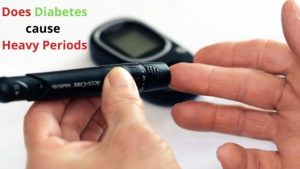
Diabetes: Does diabetes cause heavy periods? (Here is the facts)
Those who have diabetes or the related condition called Polycystic Ovarian Syndrome (PCOS) usually get their period heavy, with multiple cramps and often many of the other symptoms of heavy menopause.
People with the condition have irregular menstrual periods.
In some cases, women with PCOS have irregular periods throughout their entire reproductive years.
The irregularity can be very troubling to people with PCOS.
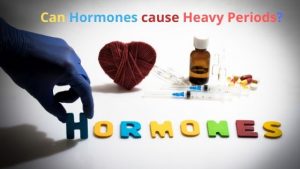
Hormones: Can hormones cause heavy periods?
Some types of hormones, specifically estrogen and progesterone, make women’s bodies regulate their menstrual cycles.
When the levels of these hormones are raised, the body will regulate the menstrual cycle.
When the level of these hormones is low, the body will not be able to regulate the menstrual cycle.
Irregular menstrual cycles can often be caused by the imbalance in hormones in a woman’s body.
Most women who have the condition get their period heavy, although the cause may differ from woman to woman.

Breast Cancer: Can breast cancer cause heavy periods?
Women who are women who have breast cancer are sometimes given the medical name “estrogenic breast cancer.”
This type of cancer occurs when the body becomes more sensitive to estrogen, and the level of estrogen is decreased.
This is particularly common in women who smoke and with a family history of the disease.
Very often, heavy menopausal symptoms occur in a woman who has breast cancer.
She will sometimes have a hectic schedule with her responsibilities and may even skip her periods.
Menopause: Can Menopause cause Heavy Periods
Many women believe that menopause is the cause of heavy menstruation.
However, this can’t be true. Menopause is not the cause of these symptoms. It is a symptom of menopause.
What is Menopause?
Menopause is the time when a woman stops having her periods and when the woman begins having her periods in cycles.
Women go through the menopause cycle, with different phases, one cycle being the beginning of menopause and the last cycle being the actual menopause.
Having a Menopause Cycle:
There are a number of different patterns for a woman’s period.
At the first phase of menopause, a woman may have a period that lasts for four to eight days, then that period will end, and she will have a heavier menstrual period.
As she continues to have her menstrual period, she may then have another period that lasts longer than the previous period.
In some cases, the cycle will go on for six to seven months, with one period lasting six months, and the other lasting for a month.
In some instances, a woman might not have any period at all during menopause.
It is only when she has her period for the first time that she will be told that she is in the menopause cycle.
Some women do not experience any menopause, but they will get their period during menopause.
The Number of Menopause Symptoms
During menopause, a woman’s menstrual period might go up and down.
When it is a lighter period, it may be followed by one that is longer than the previous period.
A woman will then need to have a heavier period to replace the lighter one.
Other menopause symptoms will be similar to the normal cycle, such as hair thinning and mood swings.
Having a Menopause Schedule
Many women who are undergoing menopause will not have a regular schedule for their period.
The time when they will have their periods may vary throughout the course of their menstrual cycles.
And their hormones might be slightly out of balance. And this may cause irregularity.

Cause for heavy menstrual bleeding (Have you been told this before?)
The main reason for heavy menstrual bleeding is a hormonal imbalance.
Most of the time, it is your menstrual cycle that causes the imbalance.
Hormone imbalances are caused by many things.
Eating too many unhealthy foods, taking a lot of supplements, unhealthy lifestyles, pregnancy, and just plain old stress can all cause a hormone imbalance.
Some of the things that can cause a hormone imbalance are:
Many women actually experience this during pregnancy.
During this time, the level of estrogen is decreased, and estrogen is the hormone that increases your monthly flow.
Another thing that can cause a hormone imbalance is stress.
Any time you are faced with any type of emotional situation, you can end up causing a hormone imbalance.
Many women also experience this during their menstrual cycle.
In order to prevent heavy bleeding, you need to focus on what is causing it.
This may require a doctor’s diagnosis of what is causing your bleeding.
Heavy Menstrual Bleeding and Headache
Heavy menstrual bleeding and headaches are some of the most common types of problems women have in a woman’s life.
But, there are many causes and remedies for this problem. You can deal with this problem with ease.
The main cause of heavy menstrual bleeding and headache is the excessive release of estrogen.
During ovulation, the estrogen level increases and this leads to sudden blood loss.
The blood and the pain are due to the increased amount of blood cells in the female body.
Here is how the excess blood flow and pain occur.
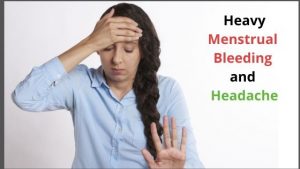 Estrogen
Estrogen
What the ovary produces is called estrogen and this is converted by the liver and into the type of estrogen called progesterone.
This causes the blood to be absorbed by the body very quickly and reaches the brain.
This further increases the amount of blood that reaches the brain.
Production of Blood Cells
Another cause of the blood clot is the production of blood cells during the period of menstruation.
Women often suffer from the fear of having blood in the vagina.
That is why women who are suffering from heavy menstrual bleeding and headaches should try to avoid eating too much food that contains alcohol.
This will help you reduce the amount of blood that will leak to the vagina.
Blood mixture with other substance
Another cause of the headache is when the blood is mixed with other substances that will cause bleeding and stopping your menstruation.
This usually happens during the first few months of the period of menstruation.
Some women also get a migraine from this.
To eliminate this problem, you should make sure that you take the proper kind of nutritional supplement at the beginning of your period.
Food intake
Some causes are due to the type of food that is taken in the body.
Some food is very rich in cholesterol and this increases the levels of estrogen.
Other causes can be due to stress
When stress causes a headache, it will lead to the blood-clotting process.
You will not feel the pain on your forehead.
Sleeping on a non-familiar Bed
Another cause of the heavy menstruation and headache is sleeping on a non-familiar bed.
It will cause a lack of circulation and the blood will be blocked in the uterus.
If you wake up in the middle of the night, you should get some rest and consult a doctor.
But, what is the best way to treat heavy menstrual bleeding and headache?
One way is to simply relax the jaw muscles which will not allow the blood to leak out of the blood vessels.
The second way to treat this problem is by maintaining a proper diet and not taking foods that are rich in fat and other inflammatory side effects.
The food that is rich in vitamins and proteins are also important to prevent the circulation from constricting the blood vessels and then causing the pain to stop.
Some of the vitamins and proteins that you can take are zinc, B vitamins, copper, vitamins B5, E, and magnesium.
If this is not enough, you can try taking a natural herbal medication that is able to bring the blood flow to normal levels.
You can buy this at a health store and it can also be found in the grocery stores.
Just be sure that the product has the highest quality of ingredients.
Severe headaches should be taken very seriously.
You should visit a doctor to be sure you are not having a stroke.
If you do have this condition, you must be treated immediately.
Your doctor can also recommend over the counter medicines that can be bought from the drugstore or grocery stores.
Treatment for Heavy Menstrual Bleeding
As many women know, excessive bleeding during a period is one of the common symptoms of dysmenorrhea, otherwise known as heavy menstrual bleeding.
It can lead to a few problems in women and theses can be numerous, especially if the treatment for heavy menstrual bleeding is prescribed.
The risks of surgery to treat dysmenorrhea are not as bad as one might imagine and it is possible for the treatments for heavy menstrual bleeding to be provided by herbs.

Herbs for Heavy Menstrual Bleeding.
Herbs may be given as a medication for dysmenorrhea.
It has been shown that the herbs are helpful for treatment for heavy menstrual bleeding and this shows the possibility that the herbs can provide treatment for dysmenorrhea.
Herbs that are good to help treat menstrual bleeding should be kept fresh and available for consumption by women.
If used as medicines, it will be very useful to keep the herbs with food as it increases their shelf life.
Best Herbs for Heavy Menstrual Bleeding
Several herbs that may be prescribed for the treatment for heavy menstrual bleeding include Hawthorn berry, Chamomile, Clematis lanceolata, and Saw Palmetto.
These herbs are good for treating dysmenorrhea and are inexpensive and can be easily purchased.
They can be bought from a pharmacy or via the internet.
Herbs are sometimes available from organic suppliers as well.
They can be shipped directly to a woman’s home.
The shipping costs will depend on the size of the jar and the weight of the herbs.
Herbs are not necessarily to be taken by pregnant women.
It is important to know when it is safe to take herbs that are given for dysmenorrhea.
If a woman is suffering from dysmenorrhea, the herbs should not be taken during or after a period.
Now let’s take a brief look at each of these herbs.
Hawthorn Berry
Hawthorn berry for Heavy Menstrual Bleeding has been an effective method of treatment for many years now.
Considered as a safe and natural form of treatment for the different forms of menopause symptoms.
Hawthorn berry is a health-friendly supplement and can be taken by anyone who is suffering from menopause symptoms.
It contains a large number of health-improving ingredients that are good for the various menopause symptoms that may affect you.
Hawthorn berry has some amazing properties that can help to help deal with your different forms of menopause symptoms.
It can help to reduce some of the severe forms of menopause such as vaginal dryness, night sweats, heavy bleeding, and night sweats.
Hawthorn berry helps to reduce the severity of these menopause symptoms.
It also helps to protect your body from various diseases which are caused by certain stress, unhealthy eating habits, and other forms of pollution.
Hawthorn berry is also useful in reducing the bad cholesterol in your body which can help in reducing the severity of your irregular menstrual periods.
It also helps in improving the functioning of the different internal organs.
Which includes your liver, intestines, kidneys, and blood pressure.
These functions are vital in maintaining your general well-being.
It can help you in achieving a good quality of life which is possible only when your vital organs are functioning properly.
Hawthorn berry for Heavy Menstrual Bleeding also helps in getting rid of most of the side effects that are associated with taking synthetic hormone replacement therapies.
This is important because of the fact that synthetic hormones that are prescribed to you after every cycle, are far riskier than herbal remedies.
Chamomile
Chamomile is a perennial plant that grows wild all over the world.
The main medicinal properties of the herb are being able to stimulate blood circulation and assist the body in absorbing other nutrients.
It also helps to heal or prevent colds and flu, treat muscle spasms and is one of the most popular herbs used in aromatherapy for relaxation.
There are many properties that make Chamomile a very effective natural remedy.
First, healing properties include the ability to promote blood flow.
This is because when there is no adequate blood flow, the plaques and plaque build-up within the lining of the arteries.
When the plaques and plaque build up in the arteries, there is a higher chance of clots to form, which is the main cause of blood clots.
Because of this, blood pressure, heart rate, and cholesterol levels tend to decrease, and the veins are enlarged, causing heavy menstruation and bleeding.
Second, Chamomile has several properties that can increase the body’s ability to absorb nutrients.
The herb helps to support the lymphatic system which is the main way in which your body absorbs nutrients from food.
Since many nutrients are derived from the food we eat, the more efficient your system is at absorbing them, the better the immune system will be.
This makes the herbs more effective in preventing diseases and illnesses.
Third, Chamomile acts as a great digestive aid by aiding in digestion and absorbing all the minerals, vitamins, and other nutrients from the food you eat.
Finally, Chamomile is an antibacterial agent and is known to kill a wide variety of bacteria including acne bacteria and even parasites.
Clematis lanceolata
One of the best and most beneficial herbs you can take is Clematis Lanceolata for Heavy Menstrual Bleeding.
The importance of this plant and its benefits in a woman’s body and in men is endless.
Clematis Lanceolata herbs help with bowel movements, ease heavy periods, and regularity.
These herbs help a woman’s skin from excessive sweating and oily skin.
The herbs help with weight gain and it helps with aches and pains.
What are the ingredients in Clematis Lanceolata for Heavy Menstrual Bleeding?
The most common ingredient in this plant is a rhizome.
It contains elements like B vitamins, vitamin C, vitamin E, lignans, flavonoids, amino acids, fatty acids, silica, vitamins, and minerals.
It also contains substances called phytosterols, which are known to kill the bacteria that cause menopause symptoms like hot flashes and vaginal dryness.
There are many health benefits to consuming this plant.
Women who experience severe PMS experience heatstroke when it comes to heating the skin.
If you suffer from high levels of blood flow to the legs, shoulders, and chest, you can get hemorrhagic strokes.
Reducing these pulses can reduce the risk of hemorrhagic strokes.
Clematis Lanceolata for Heavy Menstrual Bleeding helps decrease the pulses.
There are certain eczema herbal supplements that contain soothing extracts that help reduce itchiness.
Aside from helping you prevent PMS, it can also help you keep your cholesterol at a healthy level.

Saw Palmetto
In order to treat symptoms of menopause, research has been done and it has been found out that Saw Palmetto for Heavy Menstrual Bleeding is the most effective.
This substance has been found to provide numerous benefits to those who take it.
It is also the safest medication when compared to other types of pills.
The Saw Palmetto cream is well known to help those suffering from different conditions.
It can help with tension and hot flashes.
It is also very effective in treating the symptoms of menopause, such as nausea, hot flashes, mood swings, breast tenderness, bloating, and bleeding.
Saw Palmetto for Heavy Menstrual Bleeding is used in combination with a healthy diet.
Other problems that are treated by this treatment include endometriosis, infertility, uterine fibroids, and cervical cancer.
The Saw Palmetto is so beneficial that its effects are not only temporary but also long-lasting.
This is because the saw palmetto compound is highly natural and not addictive.
Thus, there is no need to worry about feeling withdrawal after taking the medication.
In fact, the onset of menopause can be delayed, thus making the transition of life easier.
There are a number of side effects that are associated with this medication.
These can include anemia, diarrhea, and hot flashes.
However, these are rarely seen since the compound contains a number of plant-based ingredients.
Medications for Heavy Menstrual Bleeding
Medications for Heavy Menstrual Bleeding can be very effective when used correctly.
Some of the medications are mixed in with other treatments, so this is where some people get confused.
When trying to understand what is best for you, I suggest talking to your doctor and following their advice.
Also, there are no miracle cures; but there are ways to control and treat the symptoms.
Medications for Heavy Menstrual Bleeding can vary from creams and ointments to a pill that is taken orally.
Most of these are oral medication and help in reducing the bleeding.
There are also medications that are taken orally that work in the body to help with the absorption of the medication.
The best way to know which is best for you is to talk to your doctor.
This will help you figure out what is best for you and your body, rather than just going by the advertisements you see on TV or read in magazines.
Medications for Heavy Menstrual Bleeding can be very expensive; so you should consider this when shopping for a treatment.
Some of the popular medications are oral contraceptives.
This is a very safe form of birth control that you can use while you are pregnant.
The risks involved are low because it only works during the first three months of pregnancy.
Birth control pills can be a great way to help control the bleeding.
Nonsteroidal Anti-inflammatory Drugs for Heavy Menstrual Bleeding.
The first thing to consider when considering medical therapy is which type of medications you prefer.
There are two types of Nonsteroidal Anti-inflammatory Drugs for Heavy Menstrual Bleeding.
One is called Indomethacin and the other is called Prednisone.
The reason for choosing Indomethacin is the ability to relieve and reduce the pain in the abdomen of women.
It also speeds up the treatment and reduces the bleeding.
It can also make the uterus more supple which can make it easier to give birth.
A very popular Nonsteroidal Anti-inflammatory Drug for Heavy Menstrual Bleeding is called Neurontin.
However, this medicine has the potential to cause blood clots, which can be very dangerous and painful.
So, it is wise to check out the available labels to see if you are allergic to this medicine or have any other problems.
In addition, this medicine has other side effects like numbness and tingling in the arms and legs, loss of appetite, nausea, vomiting, headaches, tiredness, anxiety, depression, shaking, and diarrhea.
Tranexamic acid for Heavy Menstrual Bleeding
If you’re suffering from heavy menstruation, then you may need to look into Tranexamic acid for Heavy Menstrual Bleeding.
Tranexamic acid is actually a very powerful antidepressant.
It is actually less potent than TCA, which is usually used as a Tricyclic antidepressant.
This antidepressant works by lowering your serotonin levels, which in turn helps to regulate your mood and energy levels.
This drug is also used for women with PMS as well as depression.
If you are going through menopause, it is suggested that you see your doctor because this drug may interfere with other medications you’re taking.
Tranexamic acid for Heavy Menstrual Bleeding is not something that should be taken along with birth control pills.
You must consult your doctor before you take any type of medication.
Another thing to remember when taking the drug is that it can cause dry mouth.
Although this drug works to regulate your mood and energy levels, it also tends to dehydrate your mouth.
If you are unable to take Tranexamic acid for Heavy Menstrual Bleeding, it is recommended that you take an antidepressant medication instead.
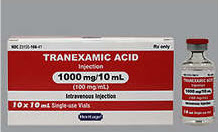
Oral contraceptives for Heavy Menstrual Bleeding
There are several oral contraceptives options to consider for women who have heavy menstruation.
But now with the use of medication, which increases the risk of ‘roid rage’Premenstrual Dysphoric Disorder’ (PMDD), women are being cautioned that they will need to take precautionary measures in case they are exposed to its side effects.
It is therefore advised that you should be the one to take the pill every day, in moderation if you can.
So, if you tend to overdo the oral contraceptive and you need to maintain it at the appropriate dosage, then you should take the oral contraceptive pill as directed.
The side effects of the different drugs vary with each one, so you need to seek help from your doctor if you want to know more about these side effects.
One of the biggest side effects that you might experience is bleeding, which can come in different forms like spotting and excessive bleeding.
Some oral contraceptives options that you can choose from are Ortho Evra, Nor-QD, Levlen, and Premarin.
Most of the times you will only get a very mild effect if you take the correct pills, but sometimes this bleeding can be very strong.
One of the things that you need to consider is the amount of dosage taken daily as some people suffer from PMDD and OCPs.
Some women suffer from excessive intake which will ultimately affect their consumption.
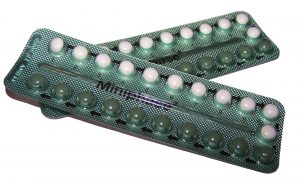
Oral progesterone for Heavy Menstrual Bleeding
Progesterone for Heavy Menstrual Bleeding is the most common solution to this problem and is available in pill form or liquid form.
The dosage of oral progesterone for Heavy Menstrual Bleeding depends on the severity of the problem.
Many individuals believe that progesterone is not an effective drug for Heavy Menstrual Bleeding and therefore will want to try alternative solutions.
This medication is designed to help the ovaries produce the proper amount of progesterone that the body needs for normal menstruation.
Progesterone works very well with estrogen, which helps the body to increase its production of this hormone.
Thus, the doctors will recommend a dosage of 100 milligrams per day.
There are many different dosages that can be used, depending on the proper dosage for the particular patient.
Do not exceed the recommended dosage of progesterone for Heavy Menstrual Bleeding.
If there is a change in the treatment, always be sure to consult your doctor.
He may need to adjust the dosage as necessary.
A change in dosage can also occur if your body goes through a physical change.
Risks of Progesterone for Heavy Menstrual Bleeding include the possibility of being pregnant if used in high doses.
These risks are seen in women who use the medication in high doses.
It is important that you inform your doctor if you are pregnant before starting the treatment.
Also, it is best that you refrain from using a prescription drug if you are breastfeeding.
Progesterone for Heavy Menstrual Bleeding is considered safe to use during lactation.
However, it is not recommended that you breastfeed while taking this medication.
Hormonal IUD (Liletta, Mirena) for Heavy Menstrual Bleeding
Hormonal IUDs are an excellent choice for Heavy Menstrual Bleeding in women.
There are many advantages to hormonal IUDs over the other methods of birth control available.
This type of device has some unique qualities that make it more effective and convenient than its counterpart, the ParaGard, other intrauterine devices (IUDs) and other contraceptives available.
It is also one of the least expensive, making this form of birth control very accessible to a large number of women.
First, when using the hormonal IUDs, Heavy Menstrual Bleeding in women can be greatly reduced.
When using a traditional contraceptive method like the Pill, there is no chance for the Pill to work over a long period of time, so the ability to become
With a Hormonal IUD, the hormonal compound prevents the ovaries from releasing an egg, thus preventing the woman from becoming pregnant.
The female hormone progestin is the hormone responsible for this natural suppression of the ovaries.
This way, the progestin hormone is kept at a low level, and therefore the associated reduction in heavy menstrual bleeding is much more consistent and permanent.
Second, the hormonal IUD is not associated with any danger for a woman who uses it during pregnancy.
Another benefit is that a hormonal IUD cannot cause infertility, because of the natural removal of the egg that occurs when the IUD is inserted.
With an alternative to the other contraceptives, a woman can become pregnant easily without any problems, something that traditional birth control methods can not provide.
So if you are concerned about heavy menstrual bleeding in women, an alternative form of birth control will give you the best chances of finally achieving the level of protection you need.
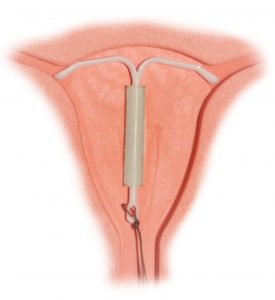
Surgical Treatment for Heavy Menstrual Bleeding
This is usually considered the least invasive option, as it leaves little scarring.
However, this can sometimes lead to other medical problems if not handled correctly.
For example, a woman who has had multiple surgeries or received Botox injections may still experience the same problems from other surgical procedures as well.
If you’re planning on surgery for heavy menstrual bleeding, however, you’ll need to be sure that you follow a strict diet and exercise plan.
Any stress will cause your body to react adversely to surgery and cause further complications.
Aside from avoiding stress, you’ll also need to make sure that you sleep on a regular basis.
This is due to the fact that surgical treatments can leave permanent scarring, which can make it harder to get pregnant in the future.
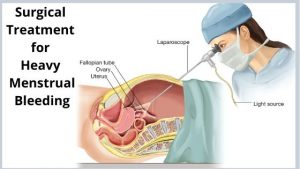
Dilation and curettage (D&C) for Heavy Menstrual Bleeding
Dilation and Curettage (D&C) is a procedure in which a vacuum is used to expel blood from the uterus.
The vacuum is not connected directly to the cervix and so the procedure does not cause any type of trauma to the cervix.
The vacuum removes the blood, which is left after the period or due to miscarriage in the uterus.
This type of procedure is performed during pregnancy by doctors as well as women.
It is a very safe procedure and therefore many women opt for it.
During D&C for Heavy Menstrual Bleeding, a doctor who is experienced in this type of procedure injects an antibiotic into the uterus in order to kill the bacteria which is responsible for the heavy bleeding.
A patient who is experiencing a heavy menstrual period will require at least one D&C procedure.
It is important that the patient has a follow-up appointment with the doctor after the procedure as the same will help the doctor in determining whether the bleeding will subside or continue for some time.
Another important consideration is that a doctor should not use the vacuums alone as this may cause damage to the membranes.
It is necessary to have several D&C visits to ensure proper healing of the hemorrhoids.
Women who experience heavy bleeding will be given a second medication once they are free from the first procedure.
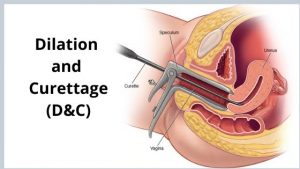
Uterine artery embolization for Heavy Menstrual Bleeding
Uterine artery embolization procedure is sometimes an option for some women with heavy menstrual bleeding cause by fibroids.
This Uterine artery embolization procedure is designed to treat uterine tumors, fibroids, and endometriosis.
In Uterine artery embolization (U.A.E.) a catheter is used to remove the clot from a narrowed Uterine artery.
The aim of this process is to shrink any fibroids in the uterus by blocking the uterine arteries thereby shutting the blood supplies.
There are several different types of Uterine artery embolization techniques that can be used to do this.
The procedure is performed in hospitals or general clinics, outpatient centers and most often by surgeons who have a specialty in U.A.E.
This procedure has been found to be extremely effective in treating uterine tumors and fibroids.
And it is the main reason why it is used when uterine tumors, fibroids, and endometriosis are being treated.
Focused Ultrasound Surgery for Heavy Menstrual Bleeding
When a doctor feels that a surgical procedure is needed to treat heavy menstrual bleeding, he or she might recommend a Focused Ultrasound Surgery for Heavy Menstrual Bleeding.
This is a newer and more efficient procedure than the older and more conventional Bariatric surgery that was used previously.
The basic idea behind this procedure is to enable the surgeon to get right inside the uterus and to correct its structural problems.
This procedure is also called a laparoscopy and has become increasingly popular in recent years as a result of advances in medical technology.
The primary goal of this surgery is to alleviate the severity of menstrual pain associated with a very heavy period.
Mostly by shrinking the fibroids using ultrasound without incisions required.
One way that this technique has been utilized is in the field of laparoscopic surgery.
The physician places the electrodes on the cervix through a V-shaped incision, which allows the flow of light from the high-powered infrared laser to reach the cervix more efficiently.
This results in the development of a blood clot which is removed by the physician.
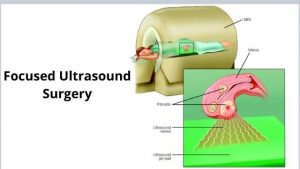
Myomectomy for Heavy Menstrual Bleeding
Myomectomy for Heavy Menstrual Bleeding is a treatment option that is commonly used to treat heavy menstrual bleeding.
It is also called Menopause Induction for Women, which is most commonly used as an alternative treatment to take place immediately before a hysterectomy procedure, or before menopause.
This method of treatment for heavy menstrual bleeding has been shown to improve women’s health and decrease the frequency of heavy periods.
However, it has not been shown to alleviate the symptoms or complications associated with heavy bleeding.
Before undergoing myomectomy for Heavy Menstrual Bleeding, you will need to understand how the process of surgery works.
This surgical process consists of severing the uterine lining of the uterus.
This procedure is very invasive and there are risks associated with it.
In addition, myomectomy for Heavy Menstrual Bleeding requires that you have pre-operative testing.
This is to determine the best approach for your individual case, as well as to evaluate any risks associated with this treatment.
Once the test results have been reviewed, you will then be recommended for myomectomy for Heavy Menstrual Bleeding.
But it is always best to seek out an expert who can evaluate your particular situation and help you determine the right treatment for you.
Remember that the treatment can be customized according to your specific needs.
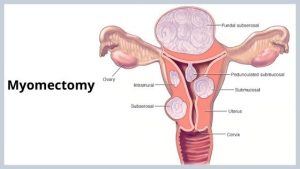
Endometrial Ablation for Heavy Menstrual Bleeding
Endometrial ablation for Heavy Menstrual Bleeding is a treatment that is used to treat severe bleeding in women.
This treatment is quite new but it has been given positive reviews in the medical community as well as in the pubic hair care industry.
You may wonder why this treatment is recommended by some doctors and scientists, while the rest may agree that the procedure is not as effective as many would hope.
However, for Heavy Menstrual Bleeding, endometrial ablation is an excellent alternative to surgical procedures that may cause scarring and other complications.
The reason for the increased interest in Endometrial Ablation for Heavy Menstrual Bleeding is due to the fact that this treatment provides women with results that are much more visible and reliable than the results that may be obtained from surgery.
For this reason, some doctors recommend this treatment to their patients when they may experience heavy menstrual bleeding for the first time.
Endometrial Ablation for Heavy Menstrual Bleeding also provides women with longer-lasting relief than may be obtained through surgery.
Endometrial Ablation for Heavy Menstrual Bleeding uses laser energy to destroy the lining of the uterine lining by which excessive blood production is prevented.
The laser will not damage the surrounding tissue or the internal structure of the uterus.
Endometrial Ablation for Heavy Menstrual Bleeding is not recommended for women who have pre-menopausal stages or for women who have had a hysterectomy.
Even though Endometrial Ablation for Heavy Menstrual Bleeding is not widely used currently, the underlying principle and treatment of this treatment has been proven to work.
Women who are experiencing heavy menstrual bleeding, or who are not sure if they are having symptoms, should discuss the use of this treatment with their doctor.
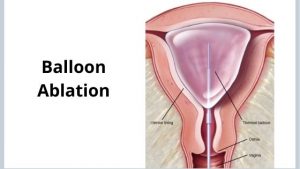
Endometrial Resection for Heavy Menstrual Bleeding
This treatment is not for everyone and unfortunately, only women who have excess amounts of the blood cells lining the endometrium can benefit from this treatment.
There are many different types of Endometrial Resection for Heavy Menstrual Bleeding.
The most common treatment is the use of a surgical needle or ligation with the ligation done in the beginning stages of the menstrual cycle.
This is often used in cases where there is no other viable treatment available.
It’s also used in cases where women are experiencing excessive bleeding during their period.
Endometrial Resection for Heavy Menstrual Bleeding can also be used for people who are having irregular menstrual cycles or for people who are suffering from extreme heavy bleeding.
This is because the endometrial tissues are the densest tissue in the body, this allows for the better visualization of the surrounding structures.
One advantage of this type of surgery is that there is no recovery time, and the patient will be able to go back to work after the surgery.
There are also different levels of pain that a person will experience after the surgery.
It will depend on the amount of bleeding that will occur after the surgery.
With endometrial resection for Heavy Menstrual Bleeding, the endometrial layers that are thin and misshapen will be cut out using instruments that are made for this purpose.
The tissue will then be attached to the patient and sutured into place.
Most people will require some type of medication before and after the surgery.
Antibiotics are used to help keep the inflammation from getting worse, as well as other medications.
The sooner the surgery is done, the sooner the patient will be healed.
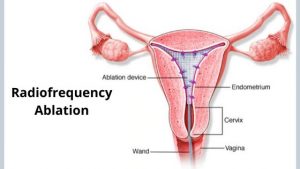
Hysterectomy for Heavy Menstrual Bleeding
Hysterectomy for Heavy Menstrual Bleeding is commonly used for patients who have undergone a hysterectomy as a result of breast cancer, herniated disk or cervical cancer.
This surgical procedure can be quite painful and is carried out in the female pelvic area to remove the uterine lining.
The abdominal region is then spongy stitched together to make a pouch.
There are numerous options open to you if you choose to have your hysterectomy.
Women who have had a hysterectomy are highly encouraged to take the following steps to make sure they have a complete recovery.
Once the surgery has been performed, it is necessary to place a thin dressing on the abdomen and the groin areas to stop bleeding.
Be sure to wear elastic-type trousers and make sure you will not be lifting anything heavy at any time.
Normally, you will have a blood test done to see what degree of bleeding you are currently suffering from.
There may also need to take antibiotics as part of your treatment to assist with the healing process.
You should also continue to take fluids as prescribed by your doctor.
The surgical team will usually go to your home to remove any internal organs that may have been injured during the hysterectomy.
You will be asked to do a physical and the surgeon will put your surgical outfit on you.
A discharge from the uterus may appear about three to four weeks after the surgery has been performed.
However, as time goes by and you heal from the surgical treatment the amount of fluid will gradually reduce.
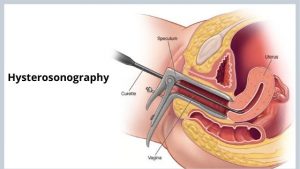
When to see Doctor for Heavy Menstrual Bleeding
If you are experiencing heavy menstrual bleeding during the luteal phase of your cycle, one of the most important questions that you should ask yourself is when to see a doctor.
Maybe it is just a change in routine, maybe you are on birth control, or maybe it is a pregnancy.
Whatever the reason, it is important to see a doctor and get an accurate diagnosis.
Heavy Menstrual Bleeding could be a sign of something more serious.
There are many medications that can be prescribed by your doctor to control this.
When to see a doctor for Heavy Menstrual Bleeding is not difficult at all.
There are many different tests that can be conducted by your doctor.
They will also determine whether or not there is a real physical problem or a psychological issue at play.
If the physician finds that there is an underlying medical condition, they may recommend an estrogen blocker medication to help get the heavier menstrual bleeding under control.
If the doctor suspects that it is just a psychological issue, they may prescribe antidepressants, which have fewer side effects than the other medications.
There are many other medications that can be prescribed as well, but these are only a few of the most popular ones.
The key to treating Heavy Menstrual Bleeding is to identify the real cause, and then to treat the underlying issues that may be causing it.
If you have Heavy Menstrual Bleeding, it is important to get a diagnosis.
Please don’t forget to share this article with your friends and let me have your thought in the comment below.








